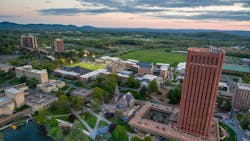UMass aiming for Carbon Zero at Amherst Campus within eight years
The University of Massachusetts Amherst unveiled a plan to power its entire 1,500-acre flagship campus with 100% renewable energy by 2032.
The university is committing to a large-scale conversion of its heating and energy infrastructure. It will transition the system from a fossil fuel-based system to a low-temperature hot water heating system with geothermal heating and cooling.
UMass Amherst also will use a combination of on-site battery-stored solar energy and some purchased from a greening electricity grid. The university will soon begin testing the geothermal capacity of its campus properties and then undertake a proof-of-concept project involving 40 campus buildings with different HVAC systems installed.
The aim is to achieve 100% renewable energy for the heating, cooling and electricity needs for its 300 buildings. It already has five rooftop systems installed that produce 10 million kilowatts of electricity annually.
The university is undertaking an in-depth financial assessment of the vision. Preliminary estimates indicate an investment of at least $500 million will be required.
“We envision a concerted, multi-year effort that includes a substantial university investment and engages sponsors, alumni, corporate donors, and diverse stakeholders in mutually beneficial partnerships to support a campus that embraces the transition to renewable energy across all domains—from facilities and physical plant to education, research and community service,” Chancellor Kumble Subbaswamy said. “UMass Amherst is, in many ways, a local community. Given our size, we are responsible for approximately 20 percent of overall greenhouse gas emissions of Massachusetts public facilities — making us the single largest contributor among state entities. So, our success in this energy transition will be the commonwealth’s success.”
EnergyTech covers the full spectrum of University and other Mission Critical Energy Transitions
University of Michigan approves Geo-Exchange project
Gallaudet University bringing 8.2-MW Microgrid to campus
The Big IDEA: Creating Decarbonization and Resiliency for Energy at Universities
Subscribe to our free email newsletter for more stories like these
Additionally, the firm is ensuring that the renovation projects underway are built to be carbon-zero ready.
For the future, the firm has planned to replace the circulatory heating system on campus that comprises 26 miles of steam pipes, transition to a low-temperature hot water system, renovate buildings and make them energy efficient and improve tracking and reporting of energy and sustainability metrics.
About the Author
EnergyTech Staff
Rod Walton is senior editor for EnergyTech.com. He has spent 17 years covering the energy industry as a newspaper and trade journalist.
Walton formerly was energy writer and business editor at the Tulsa World. Later, he spent six years covering the electricity power sector for Pennwell and Clarion Events. He joined Endeavor and EnergyTech in November 2021.
He can be reached at [email protected].
EnergyTech is focused on the mission critical and large-scale energy users and their sustainability and resiliency goals. These include the commercial and industrial sectors, as well as the military, universities, data centers and microgrids.
Many large-scale energy users such as Fortune 500 companies, and mission-critical users such as military bases, universities, healthcare facilities, public safety and data centers, shifting their energy priorities to reach net-zero carbon goals within the coming decades. These include plans for renewable energy power purchase agreements, but also on-site resiliency projects such as microgrids, combined heat and power, rooftop solar, energy storage, digitalization and building efficiency upgrades.
